 That wonderfully hot and humid time of year is upon us - summer. And of course, the rainy season and along with it, mosquito season. I still remember my first apartment in Japan, next to a large drainage pool area where I can only guess thousands of mosquito eggs were hatching every day. And then they show up at 3am - that high-pitched buzzing whine in my ear as I attempt to sleep.
That wonderfully hot and humid time of year is upon us - summer. And of course, the rainy season and along with it, mosquito season. I still remember my first apartment in Japan, next to a large drainage pool area where I can only guess thousands of mosquito eggs were hatching every day. And then they show up at 3am - that high-pitched buzzing whine in my ear as I attempt to sleep.Since being in Japan, I've struggled with the best ways to control them, and though not every solution is always 100% effective, hopefully some of these options may help you get through the summer with a few less uncomfortable, itching bites and restless nights.
Words to know
First of all, wherever you're looking for mosquito repellents or related items, you'll probably want to know some of the following words and terms:
蚊 か ka mosquito
虫 むし mushi insect
虫よけ or 虫除け むしよけ mushi yoke insect repellent
防虫 ぼうちゅう bouchuu protection against insects
忌避 きひ kihi avoid, evade
殺虫剤 さっちゅうざい sacchuuzai insect killer/insecticide
蚊取り かとり katori "remove mosquitoes"
天然成分 てんねんせいぶん tennen seibun natural ingredients
室内用 しつないよう shitsunaiyou indoor use
屋外用 おくがいよう okugaiyou outdoor use
Ingredients in Insecticides and Insect/Mosquito Repellents
You'll generally find most insect repellent products in Japan fall into one of two categories (although a few will be part of both):
Natural mosquito repellents usually contain oils such as citronella (シトロネラ油), lavender (ラベンダー油), lemon eucalyptus (レモンユーカリ精油), and other essential oils. Some may also contain pyrethrum (a certain kind of flower), such as the natural mosquito coils, in which you'll want to look for these kanji: 除虫菊. Many natural products will use 天然成分, though, keep in mind some of these still contain some chemical or harmful ingredients - so best to check the ingredient label if that is something you're concerned about.
Chemical mosquito repellents/insecticides: Nearly all of the chemical repellents and insecticides contain pyrethroid, which is a chemical imitation of pyrethrum. You'll typically find ピレスロイド系 in the active ingredient list, sometimes in parentheses, as most of the ingredients listed among chemical repellents are pyrethroids of some kind, even if the name is different. Though pyrethroid is considered safe for general use in certain amounts by the Environmental Protection Agency in the U.S. (and of course, considered safe in Japan as well), it doesn't make it necessarily healthy, especially if you have respiratory problems - so feel free to read up on it, learn more about it, and decide for yourself if it's something you feel comfortable using. Also, please remember to take appropriate precautions when using any product with pyrethroid - try to keep areas ventilated, wash your hands/skin if you come in contact with the chemical surface, etc.
The other chemical commonly used (in body/skin repellents), and which I've also mentioned in the skin repellent section, is deet (ディート), which you may already be familiar with.
Important note: when looking for the following items at your local daily goods store or home store, keep in mind that some of the insect repellent items for your body are actually located in the pharmacy area, while the others, such as insecticides and other insect repellents, will be located in another area, most likely under: 殺虫剤.
Electronic Vapor Repellents
 |
| Earth Chemical Nomat mosquito repellent |
Usually you plug them in, turn them on and they heat up the liquid that evaporates into the room. Some types are battery-powered. Also, the chemical liquid is most often fragrance-free, though you can get some fragrance types if you prefer. The natural types, on the other hand, will smell of the various essential oils they are comprised of.
*Remember to ventilate the room when you use these, though the natural one isn't so much of an issue for this, unless the scent is overwhelming.
Plug-in mosquito repellent
アースノーマット (Earth Chemical Nomat) is probably one of the more popular or common brands, but there are many other brands/types as well. This brand is featured in the picture above.
Battery powered vapor fan
The plug-in version shown above is also available in battery form - look for 電池 (battery) but many will have "どこでも" (anywhere) on the box. Other options are batter-powered fans that "blow" the vapor out, such as the one in this example.
Natural plug-in mosquito repellent
So far, I'm really only familiar with Perfect Potion Buzz Off, which I found at Loft (a large store that carries a wide variety of goods) last year (it can also be found online). So far, it seems to work pretty well, but last summer was so hot we didn't have a huge mosquito problem. So this year we'll see how it goes. Perfect Potion also sells citronella candles, and I believe I saw some citronella candles on Amazon Japan as well.
Mosquito Coils
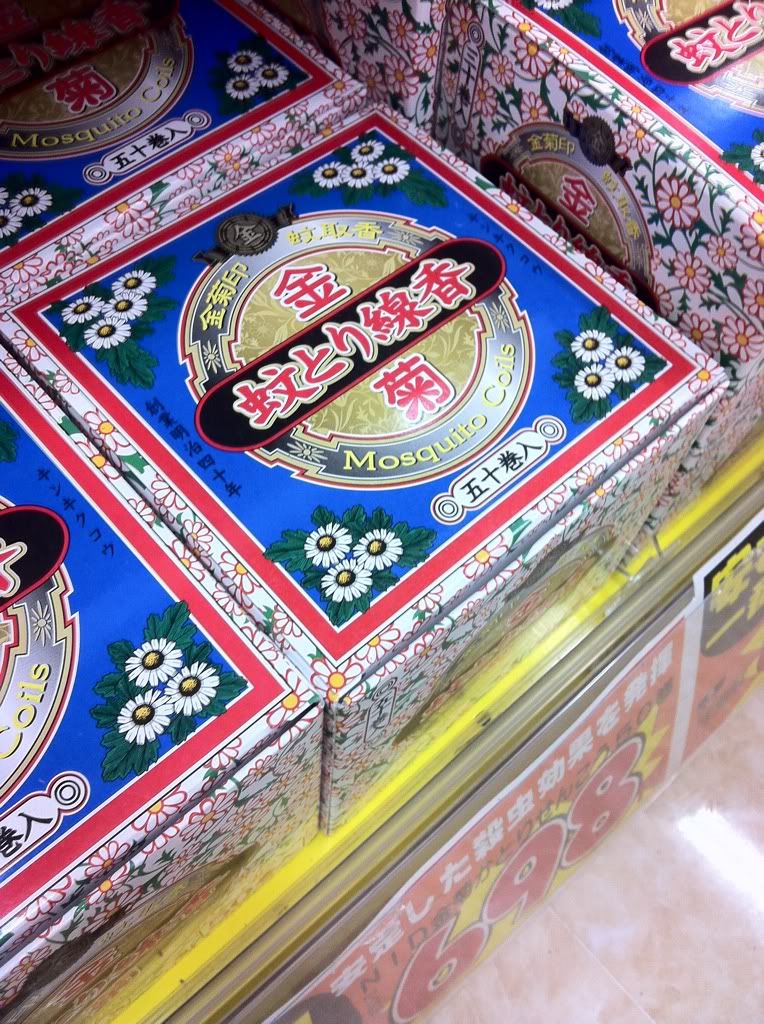 |
| Mosquito coils |
[A note on mosquito coils - aside from pyrethroid, they are made up of a bunch of other fillers, which some researchers have found to be potentially quite toxic and carcinogens. Please check out this link for more and if you do use them, use with caution. Thanks to Jenn for the tip.]
Most of the ones you'll find in stores contain derivatives of pyrethroid, though it is possible to find natural mosquito coils online. The natural coils (that I was able to find) contain pyrethrum (除虫菊 ) instead.
Hanging Insect Repellents
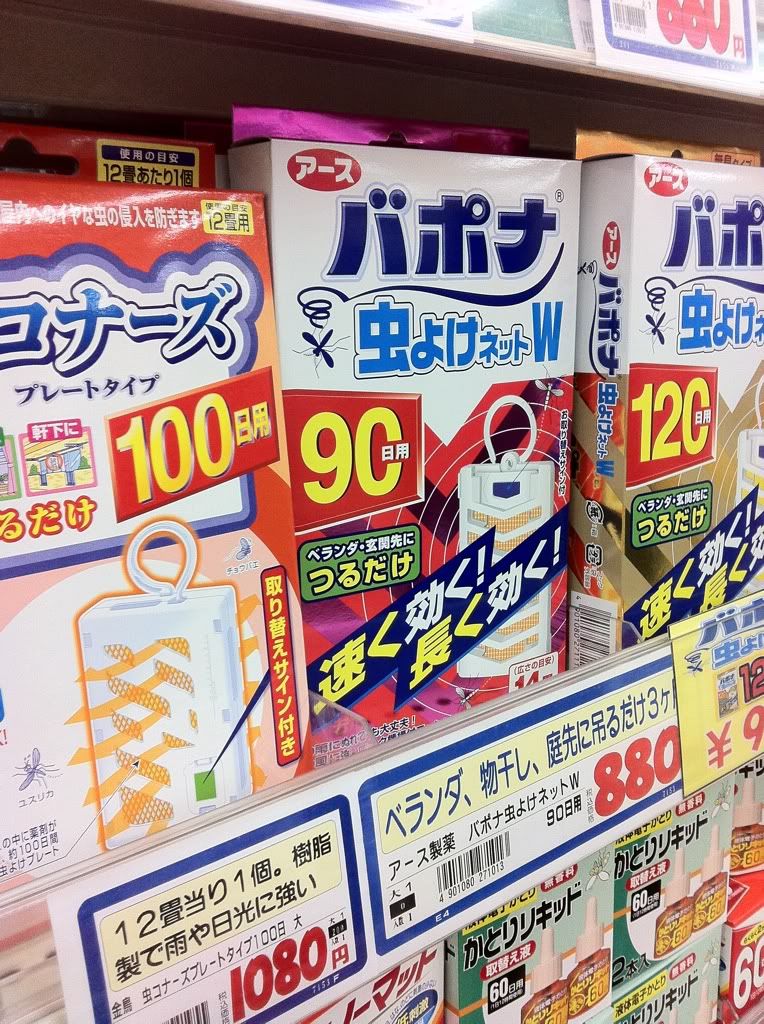 |
| Hanging insect repellents |
Different numbers of days are written on the front of the box, which indicates the number of days each product will last (for example, 90 days would be 90日 (though some will actually say "days" in English). This particular type lasts 130 days.
Some types are designated solely for outdoor use (屋外用) (such as near doorways and windows) while others can be used inside (室内用) and outside.
Insect Repellent Air Freshener
I'm not sure how popular these are, but if you'd like the combined version of an air freshener and insect repellent, 虫よけ芳香剤, they are readily available. The ingredients vary depending on the type, but I noticed some contain pyrethroid (along with deodorants and other chemicals), while those that claim to be "natural" (天然) say they use essential oils, botanical extracts, surfactant, and/or plant extracts.
Insecticide Spray
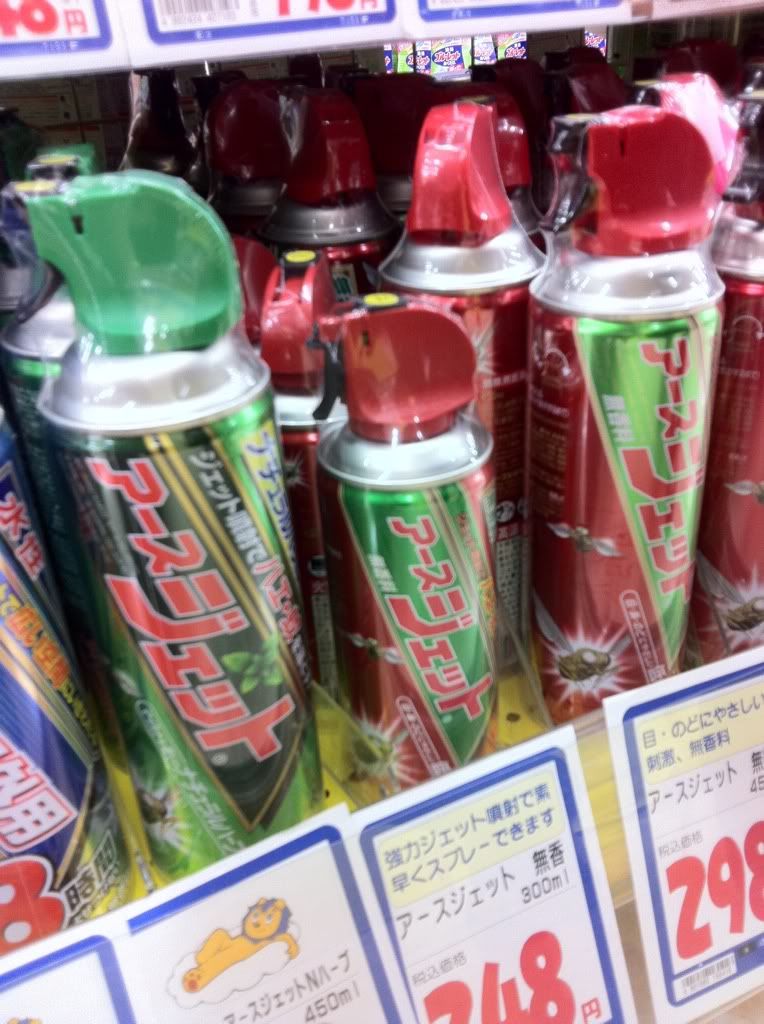 |
| Insecticide spray |
The brand in the picture (right), also has an "herbal" version, but don't be fooled, it still contains synthetic chemicals.
Skin, Body and Clothes Repellents
If you're headed to some fireworks festivals this summer, or to do some other outdoor activities, you may want to consider using insect repellent on your skin or clothes. The most common ingredient used in mosquito repellent for skin use is deet (ディート). There are some natural versions, which instead contain citronella, eucalyptus, and/or lavender oils (シトロネラ油, ユーカリ精油, ラベンダー油). Though even some of these "natural" products may still contain parabens (パラベン) - so best to check the ingredients before purchasing.
When searching online for products to use directly on your skin, you'll want to look for: 肌用 (はだよう).
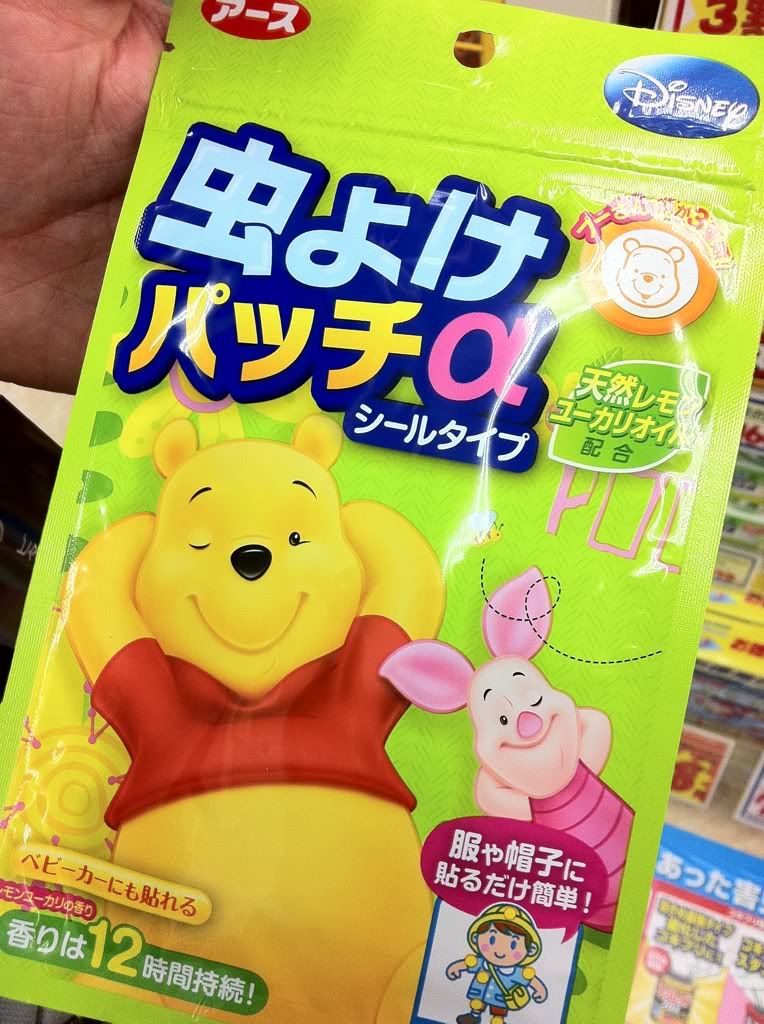 |
| Insect repellent patch - seal type |
Also seen as "シール" (seal) or "ラベル" (label). Most of the packaging for the patches are often childlike or feature children's characters. It seems the main use of the patch, or seal, is to stick them all over your child (but not directly on the skin). Stick them on clothes, hats, strollers, bags, or other similar items.
Most of these typically contain natural ingredients (essential oils).
 |
| Mosquito/insect repellents for skin |
The picture at right shows sprays you might find at a daily goods store. You can find both chemical (deet) and natural versions of these, though your local store may not carry any natural types.
Some options you may find in the store (though there are many more):
虫よけムシガード プッシュ (Mushiyoke Mushi Guard Push)
サラテクトマイルド (Saratekt Mild)
And some natural options (online, though you may find them in some stores, such as Loft or outdoors stores):
オーガニックマドンナ アロマガードミスト (Organic Madonna Aroma Guard Mist)
Perfect Potion Buzz Off Body Spray
Coleman(コールマン) 虫よけナチュラルエッセンス (Coleman Mushiyoke Natural Essence)
MOSQUITO/INSECT REPELLENT sheet type for skin (シートタイプ)
Contains deet and in the form of wipes.
MOSQUITO/INSECT REPELLENT gel/lotion for skin (塗るタイプ)
Smaller selection than sprays and I didn't see too many at the store.
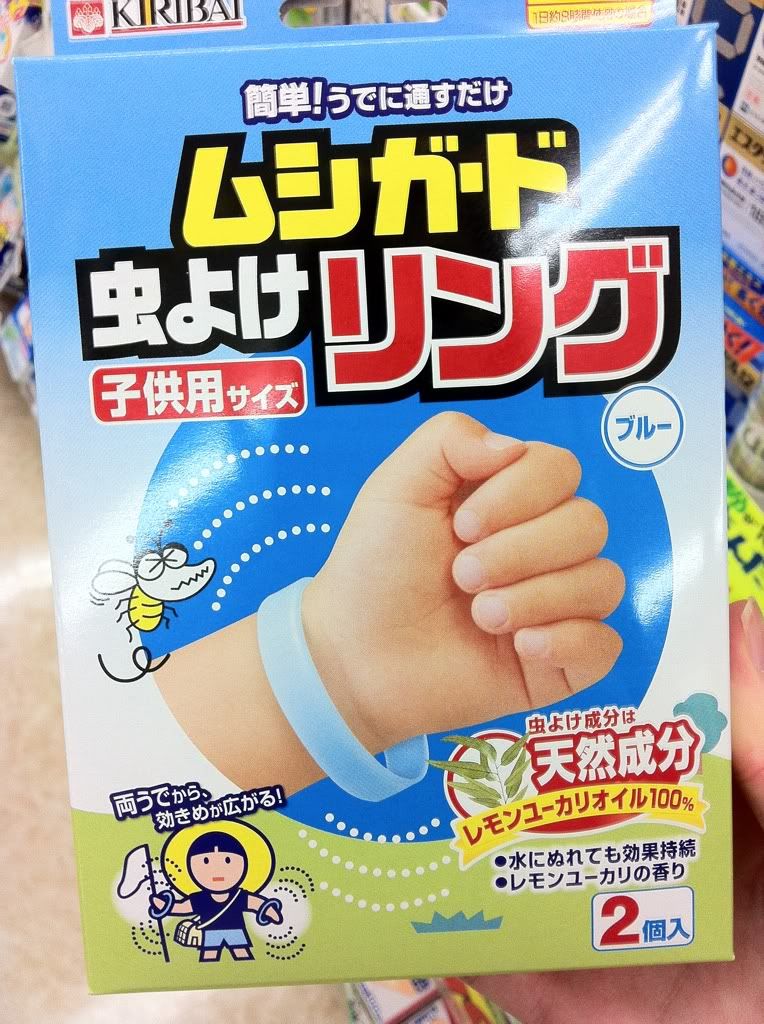 |
| Mushi Guard Mushiyoke Ring (Kid's size) |
These are essentially rubbery wristbands/bracelets that supposedly help keep the mosquitoes at bay. Most contain lemon eucalyptus oil, eucalyptus oil, lavender oil and/or citronella oil as the active ingredient. I didn't find any that contain chemical ingredients, though again, you'll want to check and make sure.
Children's size = 子供用
Adult size = 大人用
CLIP-ON and MOBILE REPELLENTS
Similar to the patch/seal/label, but instead you can either clip these onto your bag, belt, hat, etc., as per this example, or just carry around with you. Most seem to contain synthetic chemicals.
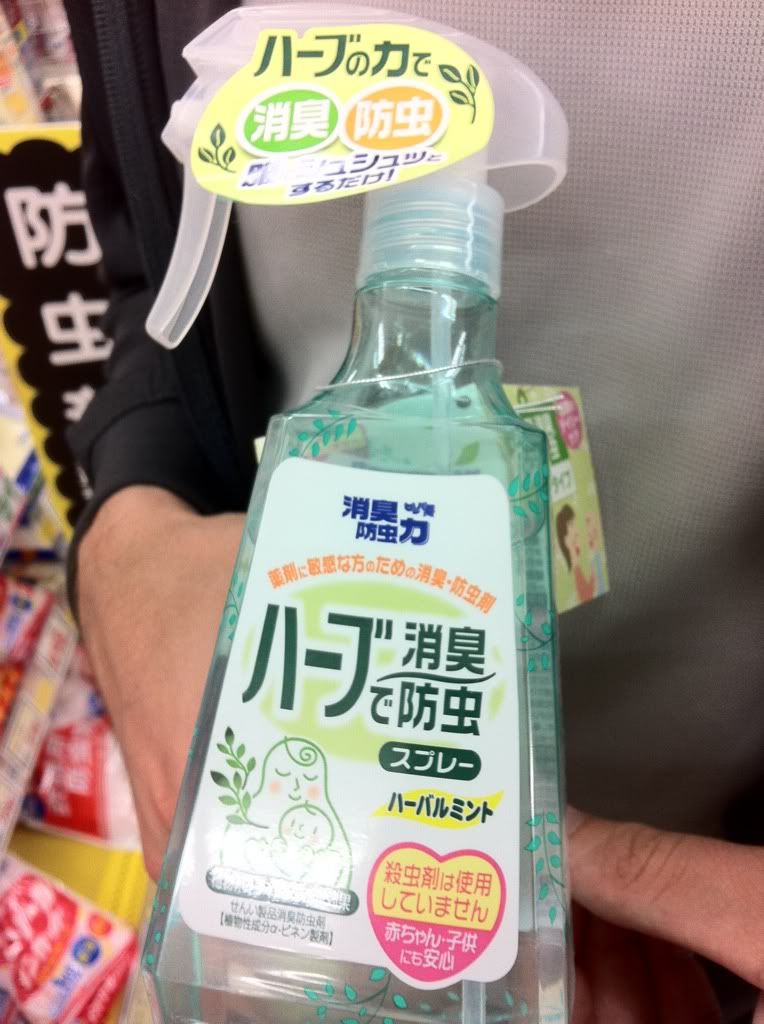 |
| Herbal insect repellent/protection for clothes |
I found this product (shown at right) to be quite interesting, especially considering it's herbal and contains only natural ingredients. I can't say how effective it is as I haven't tried it, but I may try it in the near future to see if it works. Spearmint and peppermint oil are listed under the active ingredients.
Electric shock insect-killing racket
電撃殺虫ラケット
This item seems like it would be the most fun - chasing around mosquitoes while waving an electrically-charged racket to give them a "shock". Although, I would think it might cause a bit of a mess if a mosquito just finished a meal, courtesy of you. In any case, use this item safely, as with any electronic device.
There are other electric shock options for mosquitoes, such as lamps, in which case try searching for 電撃殺虫 without the "racket" part.
Mosquito Tent or Net
A mosquito tent or net is something I've wanted to get but haven't yet, although with a baby on the way, I'm thinking about buying something to cover the baby's bed at night. There are a few listed on Amazon Japan, and I've also seen some at local home and hardware stores.
Now, I tried to include most of the main options above, plus a few others, but there really is a vast variety to choose from - especially online, but your local store will likely have an entire section devoted insect repellents. If you're looking for a few more ideas to control mosquitoes, you may want to check out this roundup of posts over at Re-nest.
Over to you - how do you best battle mosquitoes? What are your favorite repellents, or what has worked for you? Please share with us in the comments!
For mosquito bite medicine options, be sure to check out HOW TO: Find anti-itch, insect bite medicine in Japan.

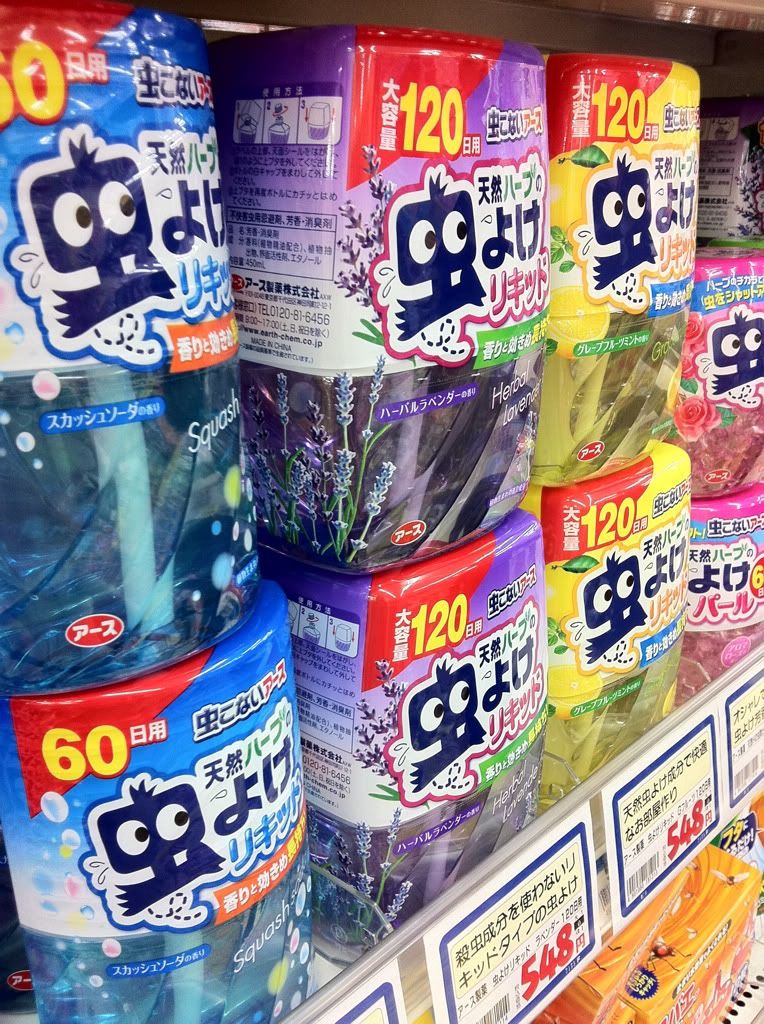
No comments:
Post a Comment